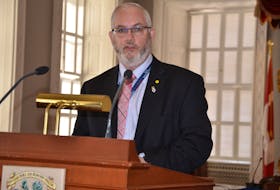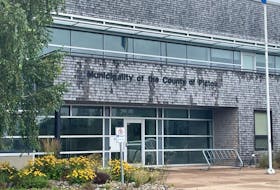WOLFVILLE
Acadia professors have voted in favour of striking after contract talks broke down with the university earlier this month.
Of the 331 full-time and part-time professors, librarians, archivists, and instructors represented by the Acadia University Faculty Association (AUFA), 81.6 per cent – or 270 members - cast ballots. Results released on Oct. 26 from that vote show that 66.2 per cent voted yes; 15.4 per cent voted no; and 18.4 per cent did not vote.
“This vote should send a clear message to the Board of Governors at Acadia University,” said AUFA president Stephen Ahern in a press release. “Our members are determined to get a fair and equitable agreement.”
Rachel Brickner, a politics professor at the Wolfville university and spokesperson for the union, says the collective agreement with the university requires 182 tenure track positions, but that number has been whittled down over the past few contracts, with the union agreeing that the university, for the length of the contract, would not have to replace any tenure track positions left vacant due to retirement or departures.
“We’ve lost about thirty or so tenure track positions,” Brickner said.
“We want to try to get that number back up because we feel it’s important to the health of the academic sector and to deliver the education we are promising our students.”
Addressing pay equity and achieving salaries in line with regional averages are also sticking points, as is a promise to fundraise for a campus childcare centre that would serve both staff and students, something that Brickner says is sorely needed on the campus.
Faculty proposals were previously rejected by Acadia’s board of governors, an Oct. 26 release says, and are asking for significant concessions, including increasing class sizes for part-time faculty while clawing back compensation.
“The academic integrity of the university is on the line here,” said Ahern. “We need the board to show a genuine commitment to the university’s academic mission. A fair and equitable collective agreement is key to this mission. It will ensure good working conditions that allow us attract and keep excellent faculty who in turn attract and teach our excellent students.”
Still hopeful for an agreement
Dr. Jeff Banks, the spokesperson for the Acadia Board of Governors and director of Open Acadia, says he is still hopeful an agreement can be reached.
“We’re still in conciliation and the Board of Governors negotiating team is certainly still optimistic that a deal can be reached in due time,” he said. “It’s not unusual for unions to seek a strike mandate while still negotiating or in conciliation.”
He added that the Board of Governors would not discuss any sticking points publicly out of respect for the collective bargaining process, but offered reassurances to students that the university was negotiating in good faith.
“We are very optimistic; the negotiations are proceeding in the same manner as they have in the past and we’ve had very good dialogue over the course of these negotiations,” Banks said. “We plan to continue to work with them to come to an agreement that allows for a financially stable future for our institution.”
Banks said the university is awaiting the next date for talks to be set by the conciliator and is willing to return to the bargaining table.
However, according to the union, talks with the board of governors broke down earlier this month. Discussions began in March 2017 and continued until the end of June, when the union says the school’s board of governors refused to make counter proposals to a faculty offer. The AUFA filed for the assistance of a provincial conciliator in early September.
Conciliation, scheduled for Oct. 16-17, stalled on the first day when the union says the employer refused to make meaningful changes to its position from June.
“After the first day, the Board of Governors had not offered any counter proposals, so the conciliator suggested we would be in a better bargaining position if we went to a strike vote,” Brickner said, adding that a second day of negotiations was cancelled.
She adds that the faculty association would like to avoid job action and remains in close contact with the Acadia Students’ Union.
“We want to reach an agreement at the table – we don’t want to go on strike,” Brickner said. “We want to get back to the table and negotiate an agreement. We don’t want to go on strike.”
Both sides will need to negotiate for that to happen, said Ahern.
“We need the board to engage in meaningful negotiation. Productive bargaining requires two committed parties,” he said in a release.
Students urge collaboration
In a press release issued Oct. 26, the Acadia Students’ Union urged both parties to come to an agreement as soon as possible.
“We strongly advise both parties to work together to explore any and all avenues in order to come to an agreement that does not negatively affect the quality or the cost of post-secondary education at Acadia,” says Acadia Students’ Union president, Grace Hamilton-Burge.
Students, she said in a release, are heavily invested in their education at Acadia. While the students’ union says it is support of a fairly negotiated agreement that benefits the quality and accessibility of students’ education, she adds that it’s important the negotiations do not negatively affect the current students.
A collective agreement that balances quality of education, affordability, and accessibility will benefit current and future students, Hamilton-Burge said in the release.
The students’ union added that it would continue to take a pro-student stance in communicating to both parties and in advocating for negotiations to continue in a timely manner.
History of labour disputes
Acadia is no stranger to labour disputes. In September 2014, the faculty filed for conciliation after negotiations for the most recent contract broke down. At the time, pay and the number of the tenured and tenure-track faculty were also key issues. Talks again broke down in January 2015 before a contract was finally reached in February 2015. In that dispute, no strike vote was taken.
There have been two strikes that cancelled classes at the Wolfville campus in recent memory - one in the winter of 2004 and the second in the fall of 2007.
The current contract expired in June 2017.









